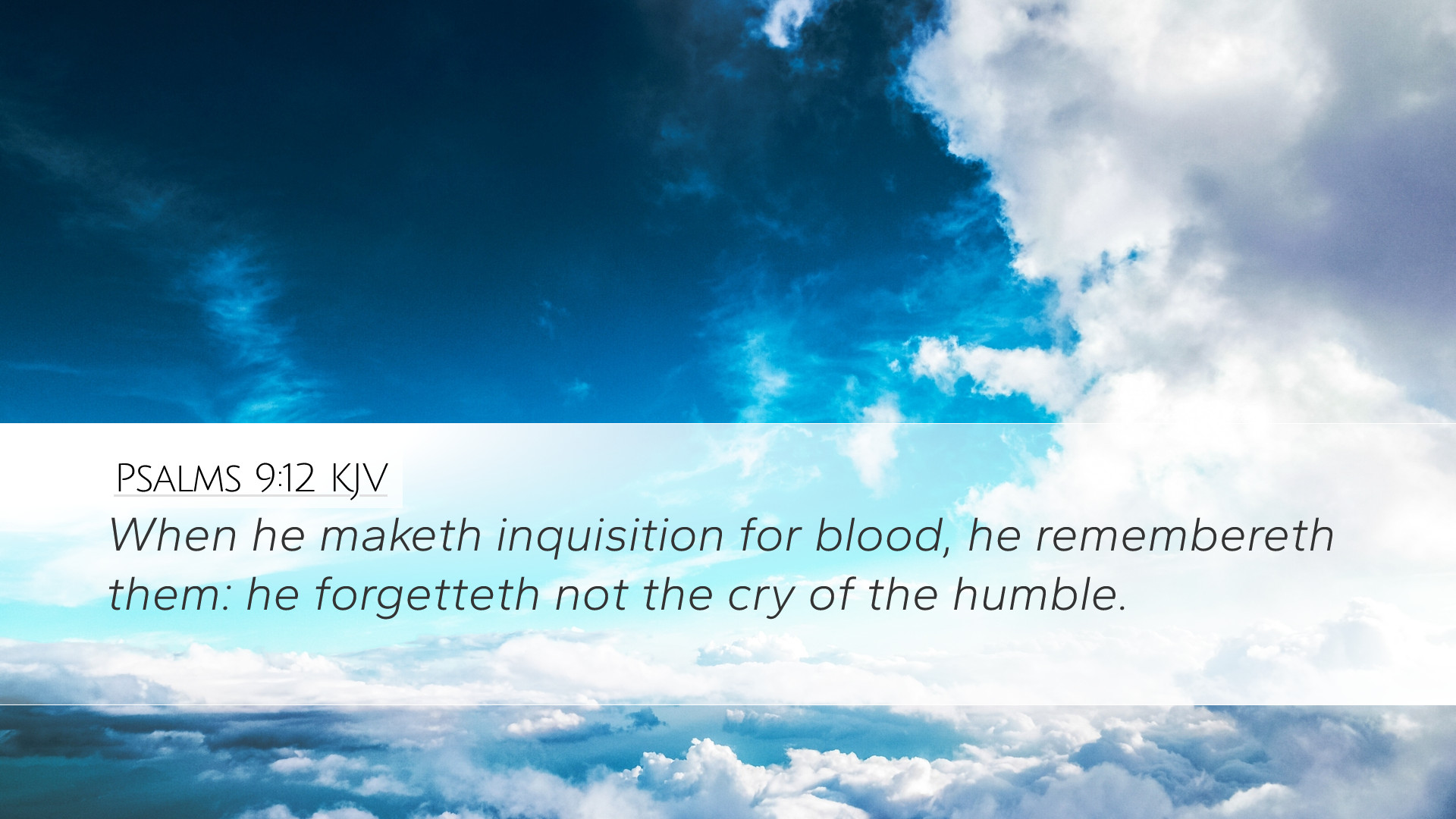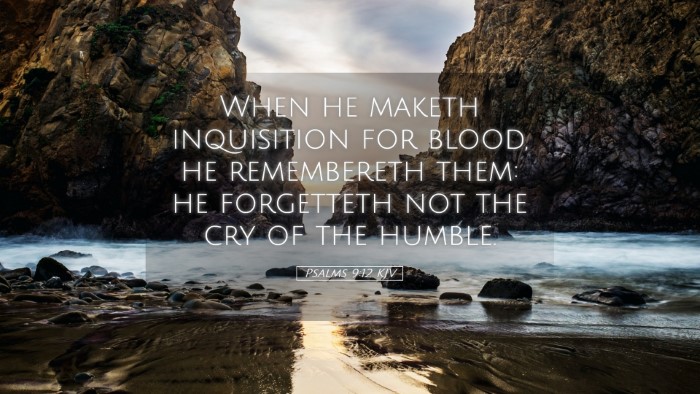Psalms 9:12 Commentary
Verse: "When he maketh inquisition for blood, he remembereth them: he forgetteth not the cry of the humble."
Introduction
Psalms 9 is a profound expression of praise, thanksgiving, and a deep acknowledgment of God's justice. In verse 12, the psalmist emphasizes God's attentiveness to the cries of the oppressed and His commitment to avenging wrongdoing, highlighting the dual aspects of divine justice and mercy.
Commentary Overview
In examining this verse, we draw insights from public domain commentaries by Matthew Henry, Albert Barnes, and Adam Clarke. Each commentator provides a unique perspective that adds depth to our understanding of the text.
Matthew Henry's Insights
Matthew Henry emphasizes the character of God as a righteous judge. He notes that "he maketh inquisition for blood" signifies that God does not overlook wrongdoing, especially regarding violence and injustice. God’s remembrance of the innocent victims and their cries signifies His inherent compassion towards the downtrodden.
- Divine Justice: Henry highlights that God's inquiries are thorough and just, ensuring that no wrong goes unpunished.
- Remembrance of the Humble: The term "them" in the verse points to those who are oppressed and humble, indicating their significance in God's eyes.
- Divine Attention: God’s memory is not like human memory; He does not forget the cries of the humble, implying His eternal awareness of their plight.
Albert Barnes' Observations
Albert Barnes offers a detailed theological reflection on the verse. He interprets "maketh inquisition for blood" as God's active role in seeking justice, particularly concerning those who have been wronged. Barnes points out that God's justice is not only punitive but also restorative.
- Retributive Justice: Barnes asserts that God ensures restitution and accountability for all acts of injustice.
- Cry of the Humble: The "cry" symbolizes a desperate plea for help, and God's acknowledgment of this cry reveals His intimate connection and responsibility toward humanity.
- Encouragement of the Faithful: The faithful are reminded that God hears their grievances, encouraging them to trust in His justice.
Adam Clarke's Commentary
Adam Clarke contextualizes this verse within the broader narrative of God's covenant relationship with His people. He explains that the psalmist is making a theological assertion about God's character, indicating He holds intimate knowledge of injustices and acts rightly in response.
- God’s Role as Defender: Clarke emphasizes that God acts as a defender of the oppressed, reiterating that no injustice is too small for Him to overlook.
- The Call to Humility: The phrase "cry of the humble" indicates a relationship where the humble can openly approach God, trusting Him with their struggles.
- Spiritual Assurance: Clarke reassures believers that God's providence is at work, and they can find assurance in His ultimate authority over justice.
Theological Themes
The verse encapsulates several theological themes that resonate with contemporary believers and scholars:
- The Nature of God: The portrayal of God as a just and empathetic figure invites readers to contemplate their understanding of divine justice.
- Human Suffering: The acknowledgment of the "cry of the humble" highlights the reality of human suffering and God's compassionate response to it.
- Justice and Mercy: The balance between justice and mercy exemplifies the complexity of God's governance over the world.
Practical Applications
This verse calls believers to practical action and reflection:
- Advocacy for the Oppressed: Followers of Christ are encouraged to stand up for the marginalized and be the voice for those who suffer injustice.
- Humility in Prayer: Understanding the nature of God's attention can lead to sincere and humble prayer life, bringing personal and communal grievances to Him.
- Trusting God's Timing: Believers are reminded to trust in God's right timing for justice and restoration, fostering patience amidst suffering.
Conclusion
Psalms 9:12 invites a multifaceted understanding of God's engagement with humanity, particularly focusing on His justice towards the oppressed. Commentators like Matthew Henry, Albert Barnes, and Adam Clarke enrich our comprehension of this verse, encouraging deep reflection on God's attributes and our response as His people.


